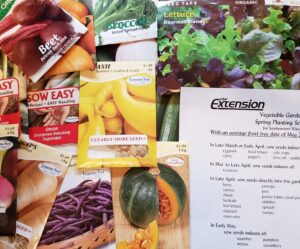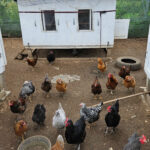Homesteading encompasses personal responsibility, education, self care, and gratitude. All of these help us make our home the center of our family.
Why would we grow our own food when we can buy it at the store? Aren’t we busy with six kids under six and homeschooling? (We’re not one of those paranoid preppers, are we?)
Why, yes, that is all true. We’re kind of heading in the prepper direction, but not out of paranoia. Jeff and I are staunchly utilitarian.
A utilitarian homestead
What besides paranoia would inspire us to work our tails off every day?
We can grow higher quality food than we can afford to buy
Right now we buy food at the grocery store. We buy as much in bulk as we can. Still, we have eight people in our family so far. Even though all the kids are small, we know we’ll have (at least) six teenagers in no time, four of them boys. Teenage boys eat A LOT! Inevitably, food prices will also increase. Jeff plans to retire within a couple of years, so his income will be fixed at that point.
To handle that situation, we can increase income or decrease expenses. We’re going to try both. Obviously homesteading works towards the latter. Probably our biggest expense after our mortgage is food, so that’s a prime target.
We’d also like to use better quality ingredients than we do right now. Sam’s Club chicken is okay, but it’s not nearly as good as free-range, hand-raised chicken. Same with eggs, milk, and other meats.
The difference is even more obvious with produce. Zucchini fresh from the garden is so much better than the old, beat up stuff that we can buy for 99 cents per pound. Pumpkins are even more robust. I figured that even though we only got a small fraction of our potential harvest this year, we probably grew at least $50 in sugar pumpkins alone.
Compared to our investment of time and equipment this year, we lost money. But we don’t have to pay for the equipment again and we’re raising a small labor force to make it more manageable (kind of joking, but the kids will help eventually). After a few years we expect that the amount we would have spent at the grocery store for all of the food we produced will eclipse the cost of equipment.
We will not take modern conveniences for granted
Water, electricity, and food don’t magically appear, though it can seem like that to kids because we just pay utility providers and pay the grocery store. In other words, money means we get stuff. It’s not wholly wrong, but that doesn’t convey that someone had to do a bunch of work to make the supply lines function. We pay for things and services because someone else is providing us something of value.
We eat a more varied diet

Some of what we grow, like Swiss chard or turnip greens, is nearly impossible to find in stores regardless of quality. Sure, we could buy spinach, but those are about the only somewhat affordable and widely available cooking greens.
From our first year–our experimental year from which we expected a mediocre harvest at best–we have in our freezer rutabaga greens, beet greens turnip greens, and swiss chard. Our spinach plants bolted early in the year. I’m not too sad about it.
Everything is fresh
Even the freshest food at the grocery store is days old. Apples can even be stored for many months before they go to market. With homesteading, we can pick tomatoes from our garden for salad the same day or harvest apples to make sauce, cider, syrup, and all manner of baked goods. (Have you seen how much dried fruit costs in the store? It’s insane!)
For milk, we can milk sheep in the morning and drink it at breakfast or lunch. Any leftovers we can turn into cheese.
Food can be preserved and we can still eat it, but nothing compares to using it or cooking it into exactly what we want shortly after we harvest it.
It instills a sense of responsibility and reward for hard work
The disconnect between work and result was one of the hardest things for me to tolerate when I had a job outside the house. I devoted hours of my time to… what? Furthering a company’s image? Adding some minuscule bit of knowledge to scientific understanding that realistically won’t help anyone? (I was a scientific researcher and then worked in public relations.)
Ugh, why bother?
Now, I can get behind piling the pumpkins, acorn squash, and buttercup squash on the front porch so we can pick away at it throughout the fall. I worked to feed my family directly, not just to earn money to spend at grocery store on semi-prepared foods because I’m away from home too much to cook them from fresh.
Hopefully as early as next year, the eggs we collect from the chickens we feed and water will become breakfast. That’s much less abstract (and useful, dare I say) than writing an article about astrophysics or earning an A on a book report.
We all will learn more about the natural world
I’m not big on nature walks in our homeschool. Checking for pests or infections in the garden or learning how to prepare a pumpkin, on the other hand, I can totally do with the kids. Likewise with feeding the animals so we can get eggs, milk, and meat. These things are useful. I like useful.
Along the way, we will learn about animal anatomy, botany, and things in nature that help or harm our animals and garden. Just spending time outside doing farm chores we’ll encounter nature. We won’t need separate walks to observe local birds or identify plants. It will be part of our daily existence.
Self sufficient? Organic? Free of processed foods?
The short answer is, if it’s useful to us, we might try it. If it’s not, nope.
We do not aim to go off grid, though we won’t rule it out at some point if it is convenient or useful. Wheat is not on our list of crops, even though it’s important for making bread. We can acquire that in bulk pretty cheaply and grains are generally a pain to process. In other words, self sufficiency is not our goal.
We certainly aren’t going to try to grow everything organically. That costs a lot more and defeats some of our money-saving goal. Jeff and I are also not convinced that there is substantial benefit to growing most things organically. It certainly doesn’t make the food any more nutritious or moral. We know what we’re putting in the soil and putting on the plants, so we can more accurately assess the safety of our non-organic home-grown food than even the organic stuff at the store.
I doubt we’ll ever completely remove processed foods from our diet. Sometimes we just need an easy dinner of chicken nuggets and tater tots for the kids, crackers for a quick snack, or a night of s’mores over a bonfire. I’m okay with that and it won’t substantially impact any of us as long as that’s not all we eat.



